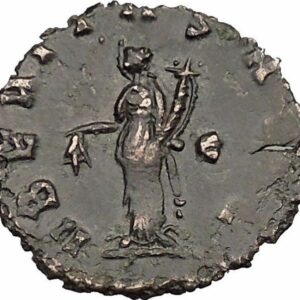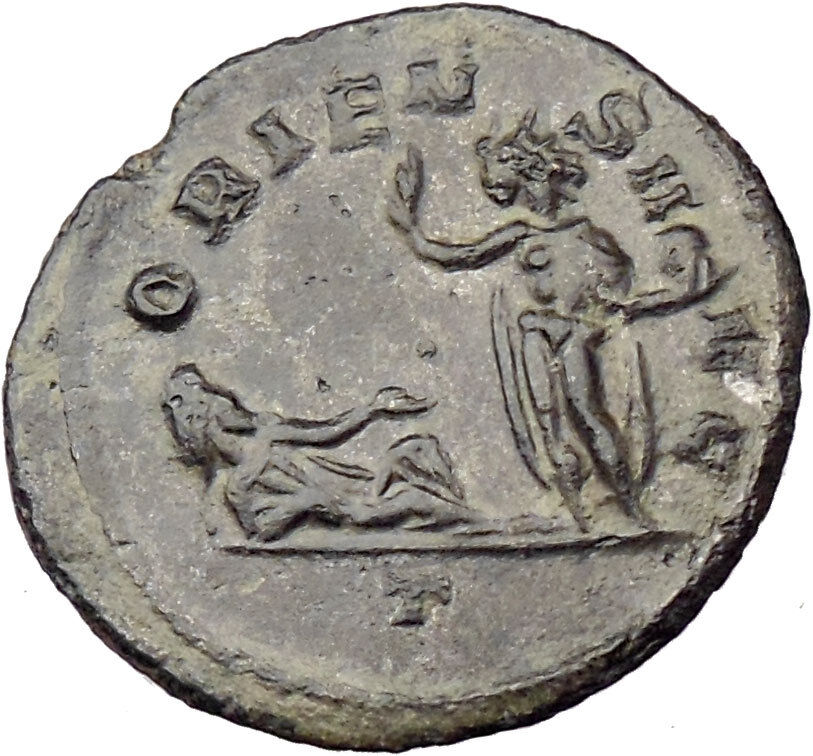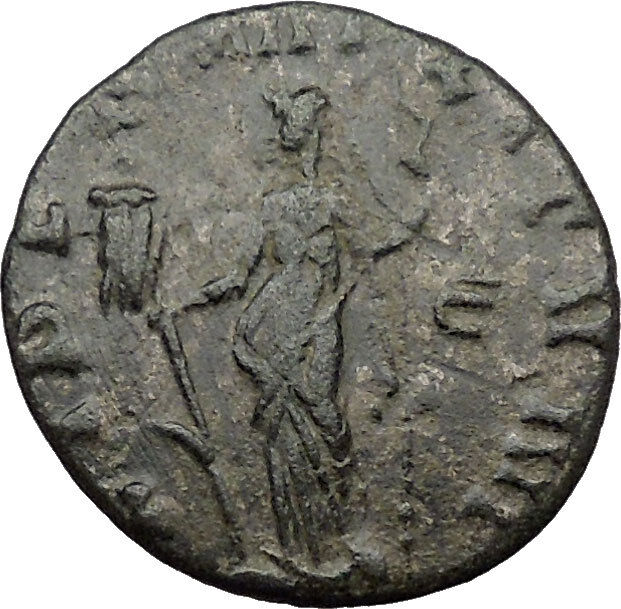|
Salonina – Roman Empress: 253-268 A.D. – Wife of Gallienus
Bronze 25mm (7.70 grams) of Ephesos in Ionia
Reference: Karwiese 1179 (V4/R24); BMC -; SNG von Aulock -.
CAΛΩNEINA CEBA, Diademed and draped bust right, set on crescent.
EΦECIΩN Δ NEΩKOPΩN, Artemis running right, holding bow and arrow; hound running right before.
You are bidding on the exact item pictured, provided with a Certificate of Authenticity and Lifetime Guarantee of Authenticity.
 Artemis was one of the most widely venerated of the Ancient Greek deities. Some scholars believe that the name, and indeed the goddess herself, was originally pre-Greek. Homer refers to her as Artemis Agrotera, Potnia Theron “Artemis of the wildland, Mistress of Animals”. In the classical period of Greek mythology, Artemis (Greek: (nominative) Ἄρτεμις, (genitive) Ἀρτέμιδος) was often described as the daughter of Zeus and Leto, and the twin sister of Apollo. She was the Hellenic goddess of the hunt, wild animals, wilderness, childbirth, virginity and young girls, bringing and relieving disease in women; she often was depicted as a huntress carrying a bow and arrows. The deer and the cypress were sacred to her. In later Hellenistic times, she even assumed the ancient role of Eileithyia in aiding childbirth. Artemis was one of the most widely venerated of the Ancient Greek deities. Some scholars believe that the name, and indeed the goddess herself, was originally pre-Greek. Homer refers to her as Artemis Agrotera, Potnia Theron “Artemis of the wildland, Mistress of Animals”. In the classical period of Greek mythology, Artemis (Greek: (nominative) Ἄρτεμις, (genitive) Ἀρτέμιδος) was often described as the daughter of Zeus and Leto, and the twin sister of Apollo. She was the Hellenic goddess of the hunt, wild animals, wilderness, childbirth, virginity and young girls, bringing and relieving disease in women; she often was depicted as a huntress carrying a bow and arrows. The deer and the cypress were sacred to her. In later Hellenistic times, she even assumed the ancient role of Eileithyia in aiding childbirth.
Artemis later became identified with Selene, a Titaness who was a Greek moon goddess, sometimes depicted with a crescent moon above her head. She was also identified with the Roman goddess Diana, with the Etruscan goddess Artume, and with the Greek or Carian goddess Hecate.
 Julia Cornelia Salonina (d. 268, Mediolanum) was an Augusta, wife of Roman Emperor Gallienus and mother of Valerian II, Saloninus, and Marinianus. Julia Cornelia Salonina (d. 268, Mediolanum) was an Augusta, wife of Roman Emperor Gallienus and mother of Valerian II, Saloninus, and Marinianus.
Julia Cornelia Salonina’s origin is unknown. According to a modern theory, she was born of Greek origin in Bithynia, then part of the province of Bithynia et Pontus, Asia Minor. However, there exists some scepticism on that. She was married to Gallienus about ten years before his accession to the throne. When her husband became joint-emperor with his father Valerian in 253, Cornelia Salonina was named Augusta.
Cornelia was the mother of three princes, Valerian II, Saloninus and Marinianus. Her fate, after the murder of Gallienus, during the siege of Mediolanum in 268, is unknown. It is likely that either her life was spared or the she was executed together with other members of her family, at the orders of the Senate of Rome.
Her name is reported on coins with Latin legend as Cornelia Salonina; however, from the Greek coinage come the names Iulia Cornelia Salonina, Publia Licinia Cornelia Salonina, and Salonina Chrysogona (attribute that means “begotten of gold”).
|





 Artemis was one of the most widely venerated of the Ancient Greek deities. Some scholars believe that the name, and indeed the goddess herself, was originally pre-Greek. Homer refers to her as Artemis Agrotera, Potnia Theron “Artemis of the wildland, Mistress of Animals”. In the classical period of Greek mythology, Artemis (Greek: (nominative) Ἄρτεμις, (genitive) Ἀρτέμιδος) was often described as the daughter of Zeus and Leto, and the twin sister of Apollo. She was the Hellenic goddess of the hunt, wild animals, wilderness, childbirth, virginity and young girls, bringing and relieving disease in women; she often was depicted as a huntress carrying a bow and arrows. The deer and the cypress were sacred to her. In later Hellenistic times, she even assumed the ancient role of Eileithyia in aiding childbirth.
Artemis was one of the most widely venerated of the Ancient Greek deities. Some scholars believe that the name, and indeed the goddess herself, was originally pre-Greek. Homer refers to her as Artemis Agrotera, Potnia Theron “Artemis of the wildland, Mistress of Animals”. In the classical period of Greek mythology, Artemis (Greek: (nominative) Ἄρτεμις, (genitive) Ἀρτέμιδος) was often described as the daughter of Zeus and Leto, and the twin sister of Apollo. She was the Hellenic goddess of the hunt, wild animals, wilderness, childbirth, virginity and young girls, bringing and relieving disease in women; she often was depicted as a huntress carrying a bow and arrows. The deer and the cypress were sacred to her. In later Hellenistic times, she even assumed the ancient role of Eileithyia in aiding childbirth. Julia Cornelia Salonina (d. 268, Mediolanum) was an Augusta, wife of Roman Emperor Gallienus and mother of Valerian II, Saloninus, and Marinianus.
Julia Cornelia Salonina (d. 268, Mediolanum) was an Augusta, wife of Roman Emperor Gallienus and mother of Valerian II, Saloninus, and Marinianus.




